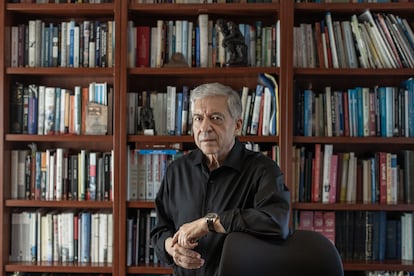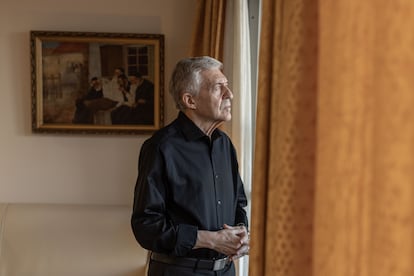Yossi Beilin: ‘The Israeli right has actively worked to undermine the Oslo Accords’
Israel’s lead negotiator of the 30-year-old agreement is an optimist, but warns that the country’s leaders can either lead it ‘to peace or war’

Yossi Beilin is the same age as Israel: 75. He was born in Petah Tikva (central district of Israel) a month after David Ben Gurion proclaimed Israel’s Declaration of Independence in 1948 and established a Jewish state that would take effect upon termination of the British Mandate. Beilin’s name is forever associated with the quest for peace with the Palestinians. As Deputy Minister of Foreign Affairs under Shimon Peres in the Yitzhak Rabin administration, Beilin is considered the architect of the 30-year-old Oslo Accords between Israel and the Palestine Liberation Organization (PLO). Peres, Rabin and PLO chief Yasser Arafat received the Nobel Peace Prize in 1994 for the groundbreaking agreement.
Beilin opened a secret communication channel with the PLO and later worked with Mahmoud Abbas, the current Palestinian president, to outline a definitive peace agreement. After serving as Minister of Justice and Minister of Religious Affairs under Prime Minister Ehud Barak, he switched from the Labor Party to Meretz, the pacifist, left-wing party that he eventually led. He remained committed to promoting peace initiatives with the Palestinians, including the Geneva Initiative in 2003 and an Israeli-Palestinian confederation proposal that was largely ignored a year ago.
Talking about Oslo’s “failure” is difficult for Beilin — it was his brainchild, after all. Though designed to last five years and be supplanted by a permanent peace agreement, it is still in effect. He holds both Israelis and Palestinians responsible for the stubborn impasse that persists, but says that Hebron settler Baruch Goldstein struck a major blow to peace efforts when he murdered 29 Palestinians in a mosque. Jewish settlements are also a major obstacle. Despite the prevailing mood of pessimism in Israel, Beilin remains optimistic that peace can be achieved.
Question. How do you view Israel 30 years after the Oslo Accords?
Answer. There is no doubt that Israel has changed. The right-wing has dominated and actively works to undermine the Oslo Accords, albeit unofficially. There has been a considerable increase in settlements and settlers, which undoubtedly detracts from any potential political resolution. This has left Palestinians feeling disillusioned, with no visible political prospects. In Israel, the hope for peace has dwindled. The potential for peace is still there, but it seems like a very distant goal.
The Oslo Accords are still in effect, and that is its greatest failure. It shouldn’t exist after 30 years. It was meant to conclude after five years, on May 4, 1999, and transition into a lasting agreement instead. However, the Oslo Accords ultimately became the official agreement.
No doubt, Israel’s right-wing exploited the international agreement by neglecting the day-to-day needs of occupied Palestinians — education, culture and their own police force. We created a deluxe occupation that cost us nothing, with no consideration for continuing Oslo or additional withdrawals of the Israeli army. The international community hardly even makes these demands anymore. The Palestinians, tragically, have become resigned to their limited options and this disappointment fuels the divide between Hamas and Fatah. The situation has changed due to all the new settlers in the West Bank, waning Israeli peace efforts, and the fading Palestinian hope for an independent state. The violence on both sides intensified after Oslo, starting with the First Intifada.
Q. Did all the parties — Americans, Israelis, Palestinians — view the Oslo Accords as an initial step towards a final solution that established a future Palestinian state?
A. I cannot speak for everyone, although I can say that it was certainly my intention. We didn’t write anything about [what the final solution should be] and, of course, the Palestinian state was not mentioned in the accords.
Q. Why not?
A. The Palestinians themselves did not want the Palestinian state to be one of the five issues included in a final agreement, because it was taken for granted. They said, “It [a state] is Palestine’s right to self-determination, which is why no mention of an independent state is needed at this point.” It was convenient for us because Peres and Rabin were not keen on explicitly referencing the Palestinian state. They wanted to stress that it was a temporary agreement, not a final one. They wanted the public to understand that it wasn’t a revolutionary move, but rather a work in progress. But it was revolutionary, because we formally recognized the PLO.

Q. Five years ago, you wrote, “It’s not accurate to say Oslo was a failure.” What did you mean?
A. Failure means that the agreement’s elements or the partnership were not right. So, I don’t see it as a failure. However, if you ask whether it achieved its objectives — obviously not. No one can say Oslo was a victory when it didn’t achieve its objectives. It’s like saying, “The surgery was successful, but the patient died.”
Q. Who is to blame?
A. The blame is shared. It started with Baruch Goldstein, that’s clear. After 40 days of Muslim mourning, there was a significant increase in suicide terrorist attacks. The violence escalated rapidly, particularly on the Palestinian side, but the one who opened the gates of hell was Baruch Goldstein. Then, of course, Rabin was assassinated.
I’m not a judge, I’m a party to this. On the Israeli side, negotiations became difficult when people were killed. The public’s anger was palpable, and people questioned our ability to engage with them. Palestinians felt Rabin didn’t truly value the agreement. And Arafat’s speeches –—they didn’t foster trust or progress either. Then, the Second Intifada began in 2000.
Q. As we discuss the past, why does peace now feel so distant?
A. Because of the settlements. And because of the rift between Hamas and Fatah, we feel like we have no viable counterpart for negotiations. However, I’m convinced that resolving the settlement issue through a confederation can lead to a Palestinian state with clearly delineated borders. In this solution, most settlers would participate in a land swap, while the remaining settlers would become citizens of Israel and permanent residents of Palestine. Likewise, an equal number of Palestinians would have the opportunity to be permanent residents of Israel. But no future Israeli prime minister will be willing to pay the political price of evacuating the settlements — there are at least 100,000 settlers.
Q. Why has the view on peace shifted, to the point where it is seldom taken seriously?
A. Before the [Camp David] peace agreement with Egypt and the withdrawal from Sinai, there was significant opposition. When [Menachem] Begin returned from signing these accords in 1979, he had the support of 70% of the population. Prior to Oslo, most Israelis were against engaging with the PLO. This changed after the Oslo Accords. The role of leadership is crucial in these situations — the public generally follows their lead in matters of peace and war. When we have courageous leaders willing to take risks, as Rabin did, people tend to accept it.
Q. Is the Mahmoud Abbas who signed the Oslo Accords different from the man he is now?
A. He remains committed to peace and opposed to violence. Unfortunately, due to his political weakness and the schism with Hamas, Abbas has become increasingly autocratic. The lack of a Palestinian parliament means decisions are made by presidential order. The situation in the Palestinian Authority is troubling — it’s heavily dependent on the international community, and there is much corruption and a lack of trust in its leaders. If an Israeli leader emerges who is not beholden to the right wing and is willing to pursue peace, a genuine dialogue can be initiated with Abbas. The world would accept an endorsement from Abbas, which is a significant advantage. This Israeli leader could be someone like [opposition leader Benny] Gantz or [Yair] Lapid — he or she doesn’t have to be another Moses.
Q. Considering last year’s elections, why do you believe Israel will change direction?
A. Since taking office, this administration has consistently been contrarian — public opinion polls frequently show that the majority supports the opposition. It’s not that people have shifted dramatically from left to right. I believe that there are still good people who seek peace, but the population can be unduly swayed, occasionally too much.
Q. Are you optimistic?
A. I am not optimistic that peace will happen, but that it can happen.
Q. And what needs to be done to make it happen?
A. We will change this government. It’s a government that will never move toward peace with the Palestinians because it is incapable of ceding Israeli territory. And that is the acid test — the whole issue is about territory. In a government that values territorial integrity above all, there is no room for discussion.
Sign up for our weekly newsletter to get more English-language news coverage from EL PAÍS USA Edition
Tu suscripción se está usando en otro dispositivo
¿Quieres añadir otro usuario a tu suscripción?
Si continúas leyendo en este dispositivo, no se podrá leer en el otro.
FlechaTu suscripción se está usando en otro dispositivo y solo puedes acceder a EL PAÍS desde un dispositivo a la vez.
Si quieres compartir tu cuenta, cambia tu suscripción a la modalidad Premium, así podrás añadir otro usuario. Cada uno accederá con su propia cuenta de email, lo que os permitirá personalizar vuestra experiencia en EL PAÍS.
¿Tienes una suscripción de empresa? Accede aquí para contratar más cuentas.
En el caso de no saber quién está usando tu cuenta, te recomendamos cambiar tu contraseña aquí.
Si decides continuar compartiendo tu cuenta, este mensaje se mostrará en tu dispositivo y en el de la otra persona que está usando tu cuenta de forma indefinida, afectando a tu experiencia de lectura. Puedes consultar aquí los términos y condiciones de la suscripción digital.









































